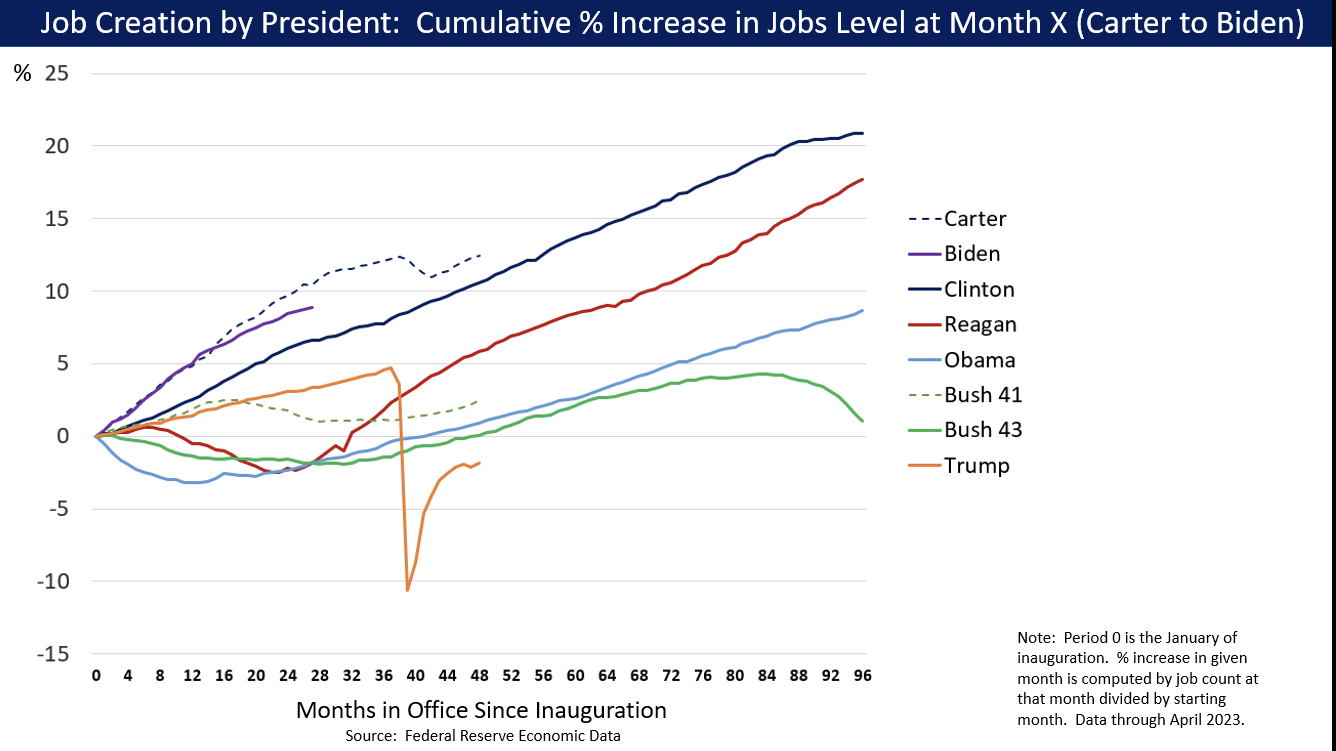BUSINESS REFLECTION
After the Bell: Why is Bidenomics working and Ramaphosanomics not?

To say that Bidenomics has worked would be a massive understatement. Job growth under Biden has increased in cumulative percentage terms faster than under any of the past eight US presidents other than Jimmy Carter, measured from their inauguration. Biden’s numbers stack up well compared to all but two presidents in the past century.
The administrations of Cyril Ramaphosa and Joe Biden are both left-of-centre (the ANC is more left, obvs) and share, at least on paper, the same broad ideas. Bidenomics, like Ramaphosanomics, is rooted in the idea of strategic intervention in the economy. US President Joe Biden focuses on investments in infrastructure, strengthening the social safety net and reinvigorating manufacturing. All this is funded by tax increases on higher-income individuals and corporations while tolerating a slight rise in overall levels of government debt.
Legislatively, the four key elements of Bidenomics were (and are): First, a $2.65-trillion infrastructure package known as the American Jobs Plan features investments over 10 years, fully paid for by corporate tax increases over 15 years. Then there are three related pieces of legislation: the Infrastructure Investment and Jobs Act, the Chips and Science Act and the fabulously misnamed Inflation Reduction Act. All three acts were, in some senses at least, government tax-and-spend programmes. The Inflation Reduction Act included money for roads and bridges, power infrastructure, passenger and freight rail, broadband, clean drinking water, airports, water and soil purification, electric vehicles and transport safety.
There is more on the table, including the American Families Plan, which offers, among other things, at least four extra years of free education — two at preschool level and two at tertiary-level community colleges. Cost? $2.2-trillion over a decade. But this failed to get off the ground after the Democrats lost their majorities in the House and the Senate.
Biden has been completely uninterested in free trade agreements and has largely maintained his predecessor Donald Trump’s protectionist policies. He is pro-union, an important constituency, and seems happy to foster tension among trading partners.
What part of that doesn’t sound exactly like the ANC? Compare, for example, the ANC manifesto, which says the party will, “consolidate industrial and sectoral master plans into a comprehensive industrial policy to drive localisation”. The document is supportive of the African Continental Free Trade Area agreement (and doesn’t mention free trade apart from that). It speaks of support for local black businesses and specifically endorses “the capacity to intervene in the economy in the interest of higher rates of growth and sustainable development”.
If you are of a slightly conservative inclination economically, the US plan seems like a kind of inverse Reaganomics: in place of lower taxes, it specifically endorses higher taxes; instead of allowing markets to rule, it proposes intervention. And so on. If you believe in Reaganomics, as almost all Republicans do, then you would conclude that this is not going to work. US economists, now dominated by conservatives, almost to a person predicted a recession. It never happened.
To say that Bidenomics has worked would be a massive understatement. Job growth under Biden has increased in cumulative percentage terms faster than under any of the past eight US presidents other than Jimmy Carter, measured from their inauguration. Biden’s numbers stack up well compared to all but two presidents in the past century. The numbers are somewhat stacked in his favour because of the Covid-19 crisis, which caused a major drop in employment. But even if you assume a lot of rebound shows in the numbers, the increase in employment has been impressive and much stronger than under Biden’s predecessor, even before Covid hit.

The ANC manifesto says, “The progress over the last five years has laid a good foundation for the more rapid transformation of the economy, with emphasis on employment creation and active, state-led industrialisation drives supported by macroeconomic policy interventions.”
And yet, as a one-time columnist for this publication, Ivo Vegter pointed out on Tuesday in the liberal journal Daily Friend, manufacturing output is lower, in nominal terms and as a share of GDP, than it was in 2018 and the unemployment rate rose from 27% in 2018 to over 32% by the end of 2023. The ANC is quite obviously smoking its socks.
The differences between Bidenomics and Ramaphosanomics are in some ways plain to see. It’s possible to agree conceptually to any number of things. Many politicians do and can get away with it because people want broadly the same things: wealth, security and services. But the devil is in the details, of course.
One pertinent difference is that Bidenomics is essentially focused on a broad range of very specific interventions in well-researched areas of clear deficiency. A good example is that the US does not produce computer chips competitively and so the administration is supporting not just local companies but international companies to set up shop in the US. The very complexity of the programme is, from a political point of view, one of its popular weaknesses, and perhaps its economic strength. Surveys suggest most Americans think the economy was better under Trump, which is simply astounding and certainly contradicted by the public record. But marketing matters, and Trump is better at it than Biden.
There is a similar disparity in SA, but in the opposite direction. I have a feeling that the economy has performed much worse than most voters appreciate and while that is affecting ANC support, it is not nearly to the extent that you might expect.
Just to take Vegter’s example, the ANC is resolutely holding to its “master plan” interventionist policy for manufacturing, even though the manufacturing sector has imploded in SA under its governance. SA’s manufacturing output as a share of GDP has steadily shrunk from 21% in 1994 to 12% in 2022. It’s bad enough statistically, but this result is particularly ironic when you consider that manufacturing is the sector the ANC most wants to succeed.
So, why does the ANC not change its policy, since it’s clearly not working? I guess if you have been punting a policy for so long, you manage to convince not only yourself but your supporters that it’s the right policy; it just needs more time, or something equally ludicrous.
My suggestion to the ANC would be to drop Ramaphosanomics, adopt Bidenonomics, and concentrate on the differences; it’s no use pretending they are not the same because the aims generally overlap. DM


















Biden is socialist in his policies and has straddled his country with massive debt for short term benefit. He also inherited a strong economy from Trump (COVID aside). Biden deserves little credit for the success of the US. Ramaphosa on the other hand has allowed the ANC Kleptocracy to run riot, with disfunction collapsing central, regional and local government, and SOEs along with labour and BEEE policies that are crippling the SA economy. SA hass alinged internationally to China, Russia, Iraq and North Korea (the new CRINK alliance), which will not go well for anyone.
And just whom do you think the MAGA lot have aligned with? Obviously the Putin/Trump axis of evil because trump told them to ditch Ukraine.
You clearly have no clue what socialism is if you think Biden is socialist.
Similar policies work in the US because they’re implemented by a largely neutral and merit-driven civil service. Same as everywhere. In SA, we could cherry-pick the best policies from every successful nation throughout history and still not progress as long as implementation and cadre-deployed corruption go hand in hand.
Exactly right. We don’t have the capacity to execute within our civil service. The best laid plans come to nothing when you hand it over to incompetent to implement. In fact at present I suspect deliberate sabotage of the execution, as one faction within the ANC tries to oust the other.